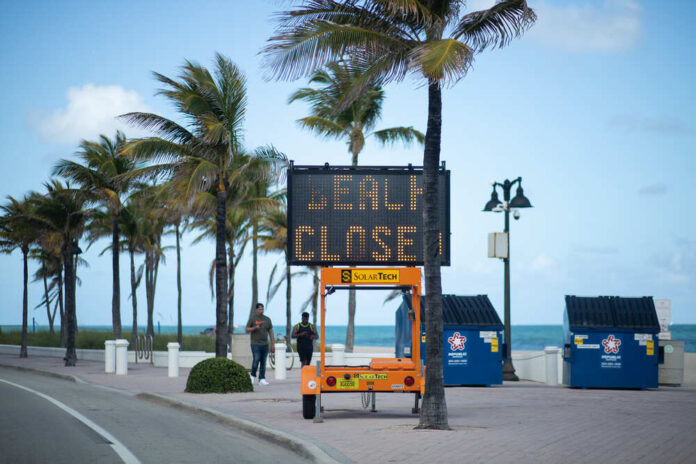
Looks like the liberal paradise of Massachusetts has found itself in quite the predicament. Eighteen beaches have been abruptly closed due to unsafe levels of bacteria in the water, leaving the tree-hugging, latte-sipping residents in a state of panic. It’s almost as if Mother Nature herself has decided to give a big middle finger to the eco-warriors who claim to have all the answers when it comes to protecting the environment.
Eighteen Massachusetts beaches are abruptly shut due to an 'unsafe' amount of bacteria in the water
18 beaches in Massachusetts have been closed due to excessive bacteria
Beaches will be reopened as soon as bacteria levels drop back to safe levels pic.twitter.com/Mi9Sto7cPJ— mountainpalm (@mountainpalm2) June 5, 2024
But fear not, dear readers, because the intrepid journalists at the Daily Mail have been on the case, digging up the dirty details of this bacterial fiasco. Apparently, routine water quality testing revealed elevated levels of enterococci and fecal coliform, which is just a fancy way of saying there’s poop in the water. That’s right, folks, the pristine beaches of Massachusetts have been turned into a giant toilet bowl, courtesy of sewage contamination and other pollutants.
Now, I know what you’re thinking. “But wait, isn’t Massachusetts a bastion of progressive policies and environmental activism?” Well, it turns out that even the most self-righteous of states can fall victim to the perils of pollution. It’s almost as if all that virtue signaling and sanctimonious lecturing about saving the planet doesn’t actually translate into real-world results. Who would have thought?
The sudden closures have left beachgoers disappointed and frustrated, with many expressing concern about the potential risks to their health and safety. Because apparently, swimming in water that’s teeming with bacteria is not exactly the summer vacation they had in mind. Local authorities have been quick to act, erecting signs warning of the dangers posed by the contaminated water and urging people to stay away. It’s like a scene straight out of a horror movie, except instead of a masked killer lurking in the shadows, it’s a microscopic menace waiting to wreak havoc on unsuspecting swimmers.
But here’s the real kicker: the closures serve as a stark reminder of the challenges facing coastal communities in maintaining water quality and ensuring the safety of recreational areas. Factors such as pollution runoff, sewage overflows, and environmental degradation can all contribute to elevated bacteria levels in coastal waters, posing a threat to public health and environmental sustainability. It’s almost as if the very policies and practices championed by the left are coming back to bite them in the behind.
"No skinny dipping today," says Ron from the North Shore.
Lynn Shore Beach is among over a dozen other beaches closed due to unhealthy bacteria levels.
Ask Alexa to play @wbznewsradio on @iHeartRadio. pic.twitter.com/rgESs8EhRv
— James Rojas (@JamesRojasMMJ) June 5, 2024
So, what’s a concerned citizen to do in the face of this bacterial onslaught? Local officials are urging beachgoers to exercise caution and to adhere to safety guidelines when visiting coastal areas. This includes avoiding swimming in closed beaches, obeying posted signs and advisories, and practicing good hygiene to minimize the risk of exposure to harmful bacteria. In other words, use common sense and don’t go jumping into water that looks like it could be mistaken for a sewage treatment plant.
But let’s be real here. The closures are a necessary precaution to prevent the spread of waterborne illnesses and to ensure the well-being of the community. It’s a bitter pill to swallow, especially for those who were looking forward to soaking up the sun and frolicking in the waves. But sometimes, we have to prioritize public health over personal pleasure, even if it means sacrificing our beach days for the greater good.
Moving forward, it’s clear that efforts must be redoubled to address the underlying factors contributing to water pollution and bacterial contamination in coastal areas. This includes investing in infrastructure upgrades, implementing stormwater management strategies, and promoting environmental stewardship to safeguard water quality for future generations. But let’s not hold our breath waiting for the liberals in charge to actually take meaningful action. They’re too busy patting themselves on the back for banning plastic straws and preaching about the evils of capitalism.
In the meantime, I suggest we all take a moment to appreciate the irony of the situation. The very state that prides itself on being a leader in environmental protection has found itself knee-deep in bacteria-infested water. It’s a harsh reminder that no amount of virtue signaling can substitute for real, tangible solutions to the problems facing our planet.
So, to the residents of Massachusetts, I say this: keep your chins up and your noses out of the water. And maybe, just maybe, take a long, hard look at the policies and practices that got you into this mess in the first place. Because as it turns out, even the most self-righteous of states can fall victim to the unintended consequences of their own hubris.














